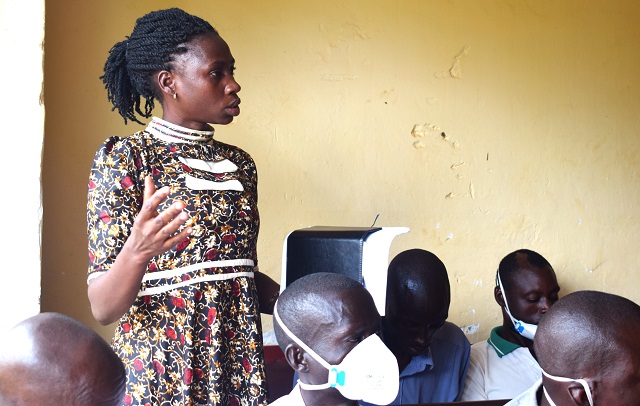
Kampala, Uganda | AGENCIES | Predominantly a sugarcane growing community, Luuka sits East of Kampala, the capital of Uganda. Nearly all families in neighbouring communities generate income from sugarcane growing, including children and adolescents who work as labourers. This and various other factors have led to increased school dropout rates in the area, and a higher prevalence of adolescent pregnancy.
In Uganda, one in four adolescent girls has a child by the age of 18. The COVID-19 pandemic also exacerbated adolescent pregnancies and new HIV infections among girls and young women. These factors hinder girls’ education and empowerment, contribute to poor maternal health, and perpetuate the cycle of poverty. According to a 2020 report, Eastern Uganda (specifically around Luuka) counts the highest rates of adolescent pregnancy among girls aged 12-17, with the district alone recording over 600 cases.
In response to the alarming rates of adolescent pregnancy in Luuka, UNESCO in collaboration with the Ministry of Health has introduced a programme to strengthen the capacity of health workers to provide health services, including sexual and reproductive health and gender-based violence services in the district.
Maureen Saaba, a health worker aged 33 at the Bulalu Health Centre, located in Luuka, is one of 33 health workers (14 women and 19 men) who participated in the training organised under what is called the UNESCO-Peking University project.
For the past three years, Maureen has dedicated her time to ensure young people and members of the community receive the essential health services and information they need to lead healthy lives. Her work with the Bulalu Health Centre involves, for example, leading mobilisation and sensitisation efforts to enhance awareness and use of health services within the community.
“I didn’t have that much knowledge on how to relate with the youth in a way the builds trust”, says Maureen. “Through the training, I learned how to engage with adolescents and young people, and work with stakeholders and peers at my local health centre to create a conducive and safe environment for youth.”
At the training, Maureen and her peers took part in role play sessions and practiced how to communicate with young people and foster safe, supportive and open dialogue. “I have hope for a much better future for those who dropped out of school, and particularly the pregnant adolescent girls I see at the centre”, says Maureen. “At least, I can now confidently guide them through their difficulties thanks to UNESCO.”
Ensuring young people access services they need
“For a long time, the youth in the communities bordering our health centre did not receive adapted youth-friendly health services,” says Maureen.
A challenge Maureen observed was to mobilise young people around their health and their rights. As part of the recommendations from the training, Maureen and the health centre’s administration established an ‘adolescent-friendly day’ every Tuesday at the centre. This is a day that specifically serves the unique needs of young people in the community.
Youth-friendly corners were also introduced, offering young people the privacy they need and where Maureen and her pees promote the use of a more friendly and supportive tone, practice confidentiality and ensure young people get the services they come into the centre for, sometimes at their own cost.
Maureen explains that in her role as a health worker, she sometimes goes the extra mile to support youth in getting a particular medication, especially when the health centre does not have it readily available.
“This extra effort has not only built trust, but it has forged stronger connections and collaboration between health workers and youth in the community. These relationships have proven instrumental in improving mobilization efforts for various services.”
A high uptake of youth-friendly health services
As a result of the youth-friendly corners and other initiatives put in place, many more young people visit the health centre to benefit from various services, including to seek information on sexual and reproductive health.
“There’s increased attendance to the health centre for services like family planning, HIV testing, safe male circumcision”, says Maureen. “I attribute this to the knowledge we gained from the training, in particular about the ways we work with youth in my community.”
With the knowledge and skills acquired at the training, Maureen now actively engages young people in her community of Bukima to visit the health centre. She shares with them positive messages of hope and healthy living.
“My message to young people is to avoid harmful practices that jeopardize their well-being and puts their lives and education at risk, such as engaging in unsafe sex, substance use and bullying”, says Maureen. “I emphasize the significance of responsible choices for positive education outcomes and a healthier future.”
Training health workers is one of the foundations in the work of UNESCO to foster a safe and healthy learning environments in which all young people are in school, informed about their health and rights, have access to the support and services they need, and are empowered to take their own decisions.
The UNESCO-Peking University project aims to advance health and education for girls in Botswana, Nigeria and Uganda. Since its inception in 2021, UNESCO strengthens the capacities of teachers and education stakeholders to provide adolescent-friendly health information, education, and services. Through this project, UNESCO has also facilitated various policy documents and processes, such as school health service standards and the national menstrual hygiene management strategic plan. In Uganda, this work took place in two districts, of which Luuka, and has reached over 5,000 young people in and out of school, to date.
This initiative complements UNESCO’s ongoing work on the Our Rights, Our Lives, Our Future Programme (O3) empowering adolescents and young people in Sub-Saharan Africa to develop the skills, knowledge and attitudes they need to prevent HIV infections, reduce early and unintended pregnancies, and eliminate gender-based violence.



